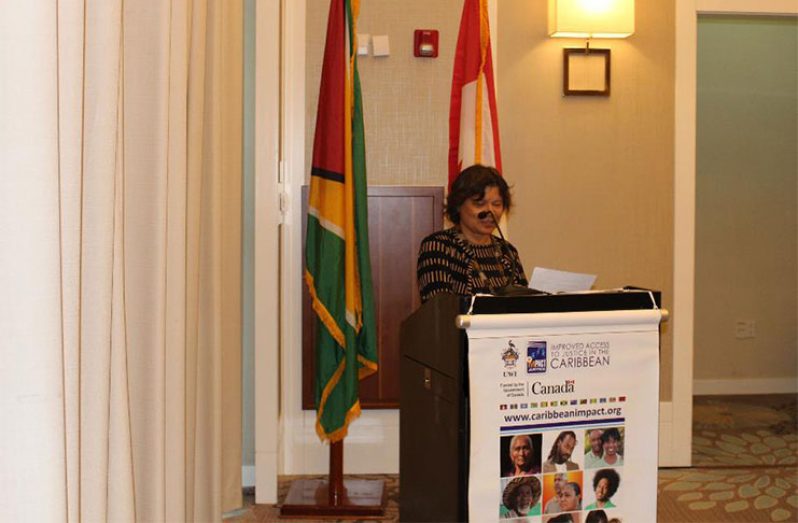– AG says region’s legal institutions stand to suffer if status quo remains
ATTORNEY General and Minister of Legal Affairs, Basil Williams said, “unless the barriers to access legal education are dismantled, the Region’s legal institutions stand to suffer.” The attorney general, at the time, was delivering an address during a public lecture on ‘Legal Education in the CARICOM Region: A review of recommendations made by the Impact Justice Legal Education Survey.’
Since taking office in May 2015, Minister Williams has been championing the cause for non-discriminatory admissions to the Regional Law Schools – a position held by President David Granger. Currently, Guyana is allowed a quota of 25 students to pursue studies at the Hugh Wooding Law School – much to the disadvantage of others who are academically qualified.
“Public legal education and information are public services which can protect persons who are victims of abuse or vulnerable to such abuse. It can provide them with the know-how on how to apply for protective orders to restrain their abusers. It can empower workers by providing information which can prevent them from being exploited on the job. It can enlighten citizens of their rights so as to avoid arbitrary arrest and unlawful detention,” the attorney general explained.
He posited too that public legal education and information strengthens public justice. Though proven to be critical, he said, legal education resources are limited, and as such, regional governments are encouraged to devote more resources. “Caribbean justice systems have to compete with other sectors for scarce budgetary resources and, as a result, public legal education and information is often underserved in national budgets,” he posited while noting that “much more can be done with little.”
Using Guyana as an example, he said the government with support from non-governmental organisations (NGOs) and international institutions has made invaluable interventions, in its quest to provide citizens with public legal information.

A series entitled ‘The Law and You’ by the Guyana Association of Women Lawyers; a Household Guide to the Domestic Violence Act produced by Red Thread; a Guide to the Juvenile Justice Act 2018 produced by the Ministry of Public Security and the United Nations Children’s Fund (UNICEF); Handbook on the Sexual Offences Act produced by Help and Shelter in conjunction with international partners; and a range of other resources are presently available to citizens. However, it said greater efforts are needed to ensure widespread dissemination.
He said it is against the background of acknowledging the importance of strengthening our justice systems, that Guyana fully embraced the Impact Justice project. Legal education and information is one of the projects four components, the attorney general pointed out, while explaining that it is intended at increasing citizens’ knowledge and awareness of their rights and other areas of the law.
Under this component, persons are trained in legal research techniques and information service delivery. Added to that, legal materials are supplied to the library collections of the Faculties of Law, UWI, the University of Guyana, the University of Technology, Jamaica; and the University of Suriname.
The provision of training and the resources, including the digitisation of the West Indian Law Journal, Caribbean Law Review and West Indian Legislation Indexing Project (WILIP) and expansion of the CARILAW database, strengthen the Regions system of legal education, the legal affairs minister detailed.
Commenting on the final report on the Survey of Legal Education in CARICOM Member States’ prepared by the IMPACT Justice Project, the attorney general said the findings will inform national and regional policy approaches to legal education and information. Guyana, he posited, looks forward to reforms which will strengthen legal education across the Region.
“Legal education remains a priority for maintaining and improving our justice systems across the Region. It is imperative to bolster the rule-of-law and provide citizens with the knowledge they need to become more active protagonists in defending their human rights,” he emphasised.
The public lecture was organised by the IMPACT Justice Project with funding from the Government of Canada. IMPACT Justice Consultant, Karen Tesheira and Professor Velma Newton, the Regional Project Director, IMPACT Justice Project, were among the speakers during the lecture which took place last Wednesday at the Guyana Marriott Hotel.
In her keynote address, Mrs. Tesheira, IMPACT Justice Consultant and Rapporteur to the Legal Education Survey Team, gave a succinct overview of the results and recommendations made in the Legal Education Survey as they related to, inter alia, the current system of admission to the Council of Legal Education’s Law Schools; whether regional governments should continue to fund legal education; whether the role of the Council of Legal Education should change to that of a regulatory, licensing and accreditation body for existing and any other law schools which could be established.
The event was also attended by Her Excellency Lilian Chatterjee, High Commissioner of Canada to Guyana and Ambassador to CARICOM, who gave remarks on behalf of the Government of Canada; and Professor Velma Newton, Regional Project Director of the IMPACT Justice Project who chaired the event and also delivered remarks on behalf of IMPACT Justice.
Also in attendance were the Honourable Madam Justice Roxane George-Wiltshire, Acting Chief Justice of Guyana; Honourable Madam Justice Bernie Stephenson, Judge of the Eastern Caribbean Supreme Court; Professor Duke Pollard, Former Judge of the Caribbean Court of Justice; members of the Magistracy; Ms. Sandra Bart, representing the CARICOM Secretariat; staff of the Ministry of Legal Affairs including the Chief and Deputy Chief Parliamentary Counsels; Mr. Teni Housty, President of the Guyana Bar Association; Ms. Shellon Boyce, President of the Guyana Association of Women Lawyers; Mr. Christopher Ram, Lecturer in the Department of Law, University of Guyana; attorneys-at-law; staff of the Canada High Commission to Georgetown; the President of the Guyana Association of Law Students, law students and other interested persons.



.jpg)








